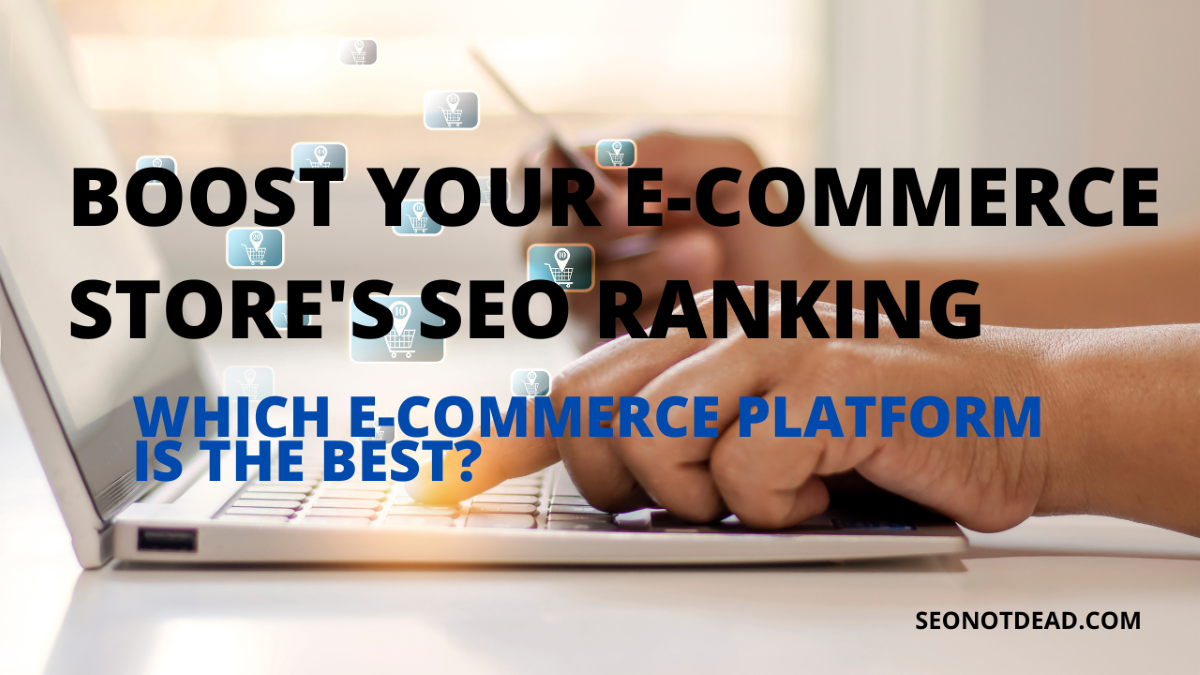Regarding e-commerce, search engine optimization (SEO) is essential for any successful business. Finding the best e-commerce platform for SEO can be difficult, as many different options exist. However, certain features make specific platforms more SEO-friendly than others. In this article, we’ll dive into the top e-commerce platforms and evaluate their SEO capabilities to help you make an informed decision.
As an online store owner, you constantly seek ways to improve your website’s search engine optimization (SEO) to drive more traffic and increase conversions. Choosing the right e-commerce platform can significantly impact your SEO efforts. Still, with so many e-commerce platforms available, knowing which is the best for your business can be challenging.
Introduction:
The best e-commerce platform for SEO offers robust SEO features, such as keyword optimization tools, detailed analytics and reporting, and a content management system. Businesses can use these platforms to drive organic traffic and increase their rankings when coupled with an effective search engine optimization strategy.

We’ll examine the criteria for selecting an SEO-friendly e-commerce platform and compare the popular e-commerce platforms such as Shopify, WooCommerce, Magento, BigCommerce, Wix, and Squarespace.
Criteria for Choosing an SEO-friendly E-commerce Platform
When selecting an e-commerce platform, it’s crucial to consider several factors that can affect your website’s SEO performance. Here are some criteria to keep in mind:
- User-friendly interface: Your e-commerce platform should have an intuitive, easy-to-use interface that allows you to optimize your website’s content quickly.
- Mobile optimization: With most online shoppers using mobile devices, your website must be mobile-friendly for optimal SEO performance.
- Page speed and performance: Slow loading times can hurt your SEO rankings, so choose an e-commerce platform prioritizing fast page speeds and performance.
- URL structure: A clear and organized URL structure can help search engines understand your website’s hierarchy and improve its visibility in search results.
- Customization options: Choose a platform that offers customization options, so you can optimize your website’s design and content to meet your SEO goals.
- Security and SSL certificates: Search engines prioritize secure websites, so ensure your e-commerce platform has strong security measures and offers SSL certificates.
Considering these criteria, you can narrow down your options and choose an e-commerce platform best suited for your SEO needs.
Comparison of Popular E-commerce Platforms for SEO
Now that we’ve established the criteria for selecting an SEO-friendly e-commerce platform let’s take a closer look at some of the popular options and evaluate their SEO capabilities.

Shopify
Shopify is one of the most popular e-commerce platforms, known for its user-friendly interface and easy customization options. Shopify’s SEO capabilities are impressive, offering features such as meta titles and descriptions, custom URL structures, and mobile optimization. Shopify also offers built-in integrations with various SEO tools, making optimizing your website’s content for search engines easy.
Let’s take a closer look at Shopify’s SEO capabilities. Shopify offers a range of built-in SEO features, making optimizing your website’s content for search engines easy. Here are some of Shopify’s SEO capabilities:
- Customizable URL structures: Shopify allows you to create custom URL structures for your website’s pages and products, making it easier for search engines to understand your website’s hierarchy.
- Mobile optimization: Shopify offers mobile-responsive themes and lets you preview how your website will appear on mobile devices.
- Built-in integrations: Shopify offers built-in integrations with famous SEO tools such as Google Analytics and Google Search Console, making tracking and improving your website’s performance easy.
- Meta titles and descriptions: Shopify allows you to customize your website’s meta titles and descriptions, making it easier for search engines to understand your website’s content.
Pros:
- User-friendly interface
- Strong mobile optimization
- Built-in SEO features and integrations
Cons:
- Limited customization options compared to other e-commerce platforms
- Higher transaction fees for third-party payment gateways
WooCommerce
WooCommerce is a popular e-commerce platform for WordPress users, offering a range of customization options and integrations with popular SEO plugins such as Yoast SEO. It allows you to optimize your website’s content for search engines with features such as custom URL structures, meta titles and descriptions, and mobile optimization.
It is an open-source e-commerce platform that offers extensive customization options and integrations with popular SEO plugins such as Yoast SEO. Here are some of WooCommerce’s SEO capabilities:
- Customizable URL structures: It allows you to customize your website’s URL structure, making it easier for search engines to understand your website’s hierarchy.
- Mobile optimization: It offers mobile-responsive themes and lets you preview how your website will appear on mobile devices.
- Integrations with popular SEO plugins: It integrates with popular SEO plugins such as Yoast SEO, making it easy to optimize your website’s content for search engines.
- Meta titles and descriptions: WooCommerce allows you to customize your website’s meta titles and descriptions, making it easier for search engines to understand your website’s content.
Pros:
- Flexible customization options
- Integrations with popular SEO plugins
- Mobile Optimization
Cons:
- Requires WordPress knowledge to use it effectively
- Limited support compared to other platforms
Magento
Magento is a powerful e-commerce platform designed for larger businesses with complex needs. It offers advanced SEO capabilities, such as customizable URL structures, canonical tags, and schema markup. Magento also offers built-in integrations with various SEO tools and supports multilingual websites for global SEO strategies.
It’s a powerful e-commerce platform designed for larger businesses with complex needs. Magento offers advanced SEO capabilities, making it a popular choice for businesses with significant traffic volumes. Here are some of Magento’s SEO capabilities:
- Customizable URL structures: Magento allows you to customize your website’s URL structure, making it easier for search engines to understand your website’s hierarchy.
- Mobile optimization: Magento offers mobile-responsive themes and lets you preview how your website will appear on mobile devices.
- Advanced SEO capabilities: Magento offers advanced SEO features such as canonical tags and schema markup, making it easier for search engines to understand your website’s content.
- Built-in integrations: Magento offers built-in integrations with famous SEO tools such as Google Analytics and Google Search Console, making tracking and improving your website’s performance easy.
Pros:
- Advanced SEO capabilities
- Multilingual support for global SEO
- Built-in integrations with various SEO tools
Cons:
- Requires technical knowledge to use effectively
- Higher cost compared to other platforms
BigCommerce
BigCommerce is an e-commerce platform known for its robust SEO capabilities, offering features such as customizable URL structures, automatic sitemap generation, and mobile optimization. It also offers built-in integrations with various SEO tools, making optimizing your website’s content for search engines easy.
BigCommerce is an e-commerce platform that offers robust SEO capabilities, making it a popular choice for businesses looking to improve their website’s SEO performance. Here are some of BigCommerce’s SEO capabilities:
- Customizable URL structures: It allows you to customize your website’s URL structure, making it easier for search engines to understand your website’s hierarchy.
- Automatic sitemap generation: BigCommerce automatically generates sitemaps for your website, making it easier for search engines to crawl and index your website’s content.
- Mobile optimization: BigCommerce offers mobile-responsive themes and lets you preview how your website will appear on mobile devices.
- Built-in integrations: BigCommerce offers built-in integrations with famous SEO tools such as Google Analytics and Google Search Console, making tracking and improving your website’s performance easy.
Pros:
- Robust SEO capabilities
- Automatic sitemap generation
- Built-in integrations with various SEO tools
Cons:
- Limited customization options compared to other platforms
- Higher cost compared to other options
Wix
Wix is a website builder with e-commerce capabilities, making it a popular choice for small businesses. It offers basic SEO features such as customizable URL structures, meta titles, and descriptions. However, Wix has limited customization options, and optimizing for mobile devices can be challenging.
Wix is a website builder with e-commerce capabilities, making it a popular choice for small businesses. While Wix offers basic SEO features, its customization options are limited. Here are some of Wix’s SEO capabilities:
- Customizable URL structures: It allows you to customize your website’s URL structure, making it easier for search engines to understand your website’s hierarchy.
- Mobile optimization: Wix offers mobile-responsive themes, but its customization options for mobile devices are limited.
- Basic SEO features: Wix offers basic SEO features such as meta titles and descriptions, but its customization options are limited.
Pros:
- Easy to use for beginners
- Affordable pricing options
Cons:
- Limited SEO capabilities
- Limited customization options
- Challenging to optimize for mobile devices
Squarespace
Squarespace is a website builder with e-commerce capabilities, making it a popular choice for small businesses. It offers basic SEO features such as customizable URL structures, meta titles, and descriptions. However, Squarespace has limited customization options and can be challenging to optimize for mobile devices.
Squarespace is a website builder with e-commerce capabilities, making it a popular choice for small businesses. While Squarespace offers basic SEO features, its customization options are limited. Here are some of Squarespace’s SEO capabilities:
- Customizable URL structures: Squarespace allows you to customize your website’s URL structure, making it easier for search engines to understand your website’s hierarchy.
- Mobile optimization: It offers mobile-responsive themes, but its customization options for mobile devices are limited.
- Basic SEO features: It offers basic SEO features such as meta titles and descriptions, but its customization options are limited.
Pros:
- Easy to use for beginners
- Affordable pricing options
Cons:
- Limited SEO capabilities
- Limited customization options
- Challenging to optimize for mobile devices
Also Read: SEO for Shopify Stores: A Complete Guide (2023)
Conclusion
In conclusion, choosing the right e-commerce platform is critical to improving your website’s SEO performance. By evaluating the criteria for selecting an SEO-friendly platform and examining the SEO capabilities of popular options such as Shopify, WooCommerce, Magento, BigCommerce, Wix, and Squarespace, you can make an informed decision on which platform is best suited for your business needs.
Each platform offers unique advantages and disadvantages, and choosing the one that aligns with your business goals and SEO strategy is essential. Shopify is an excellent choice for businesses with a user-friendly interface and solid mobile optimization. At the same time, WooCommerce is a good choice for those who want extensive customization options and integrations with popular SEO plugins.
Magento is a robust platform that offers advanced SEO capabilities, making it ideal for businesses with complex needs and significant traffic volumes. BigCommerce is famous for its robust SEO capabilities, automatic sitemap generation, and built-in integrations with various SEO tools.
Finally, Wix and Squarespace are affordable options that offer basic SEO features but limited customization options, making them a good choice for small businesses just starting with e-commerce.
By understanding the SEO capabilities of each e-commerce platforms, you can make an informed decision on which one is best for your business, ultimately driving more traffic and increasing conversions.
- Google Ads Customer Service Woes: An Urgent Call for Improvement - January 17, 2024
- Microsoft Copilot Levels Up: Introducing Copilot Pro for $20/Month - January 17, 2024
- Understanding SEO Perfection According to Google’s John Mueller - January 2, 2024

